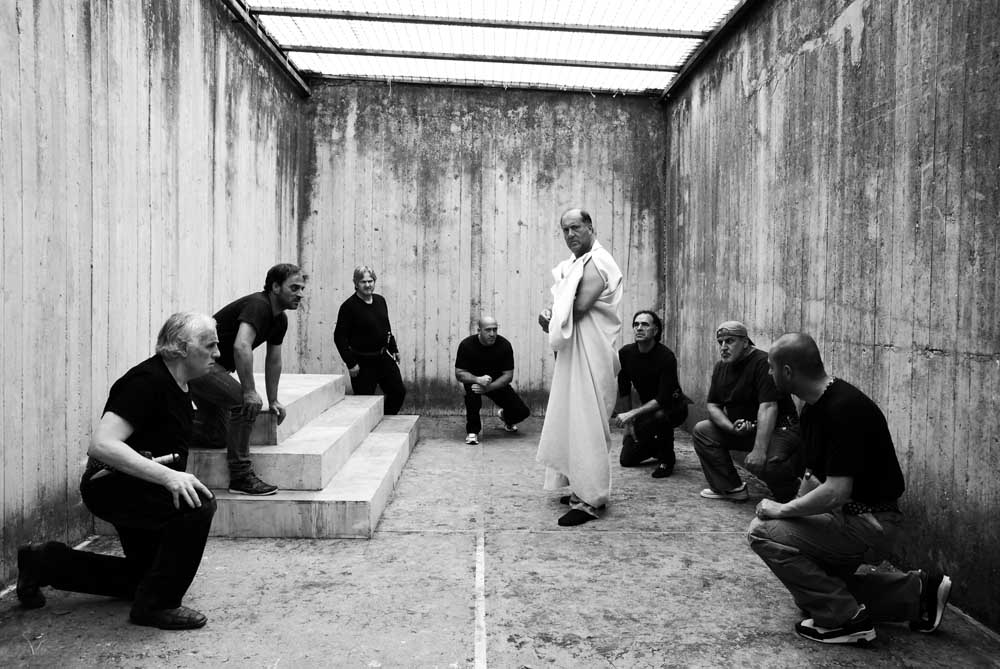Title: CAESAR MUST DIE
Adopt Films
Director: Paolo Taviani, Vittorio Taviani
Screenwriter: Paolo Taviani, Vittorio Taviani
Cast: Cosimo Rega, Salvatore, Striano, Giovanni Arcuri, Antonio Frasca, Juan Dario Bonetti, Vittorio Parrella, Rosario Majorana, Vincenzo Gallo
Screened at: Review 1, NYC, 1/29/13
Opens: February 6, 2013
Blending documentary with fiction, Paolo Taviani and Vittorio Taviani illustrate how creative prisoners can be. In this case a number of cons in Rome’s maximum security Rebibbia prison complex rehearse Shakespeare’s Julius Caesar with the aim of performing before what appears to be a chic group of Rome’s citizenry. When the brief 76 minutes of the film is over, you might be tempted to reward these motivated and talented convicts with reductions in their sentences and, if you agree with me, you might want to pardon those incarcerated for peddling drugs. They’re obviously innocent because in Italy where the natives daily enjoy pasta, pizza, cappuccino and ricotta cheese cake, who’d have the slightest interest in buying coke and crack?
The Taviani brothers, known for such films as “Padre padrone” (a Sardinian boy escapes his harsh upbringing by slowly educating himself), and “The Night of the Shooting Stars” (a glimpse of war through the memory of an impressionable child), take on the challenge of molding hardened criminals into an acting troupe by using a play that feeds into the emotions and urges of its thesps.
Filmed in black and white with the exception of scenes from the actual performance of the play, “Caesar Must Die” casts all prisoners who want to partake—at least as spear carriers (weapons are presumably made of rubber or plastic)—and the exceptional ones in the leading roles. As Simone Zampagni photographs the males who have been told to use their own provincial dialects, we watch Salvatore Striano tear up the scenery as Brutus, the lead character. Striano is a ringer, formerly jailed as a juvenile offender before spending many years behind bars in Rebibbia. Freed from a 2006 pardon, he returns to the jail to take on the central role and does so such remarkable passion. Given both his appearance and his fervor, you might swear that he is Al Pacino in disguise knocking out a particularly melodramatic role.
Thematically Julius Caesar, one of the easiest of Shakespeare’s tragedies, one often assigned in middle school to introduce students to a writer that few will ever return to once out in the real world, is right up the prisoners’ alley as the play deals with life, death, friendly and betrayal. As concerns the last of these sins, one section of the prison, in fact, is walled off from the rest, the inmates in protective custody for presumably ratting out some others. The reality, unfortunate for those victimized by their own anti-social acts, is that after releasing their emotions—in one instance “Brutus” asks his fellows on the stage to help him die—rehearsal time is limited. Soon, each day, the men are escorted back into their bleak cells, sealed from the world with both iron bars and a steel door that closes out their world.
“Caesar Must Die” did not make the five-film short list for Oscar consideration but serves as an impressive entry from Italy for best foreign film of 2012.
Unrated. 76 minutes © 2012 by Harvey Karten, Member, New York Film Critics Online
Story – B
Acting – B+
Technical – B+
Overall – B+

